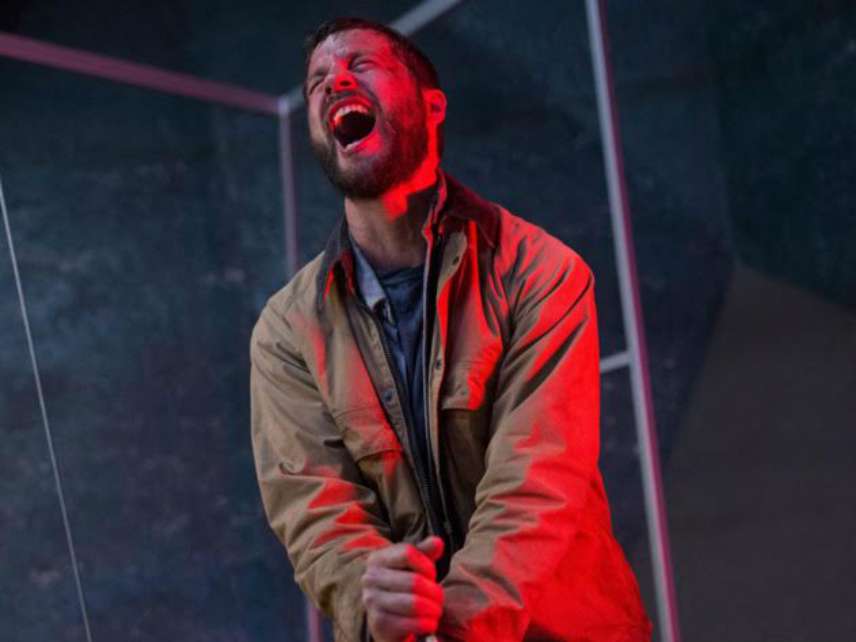Movie Review: Upgrade
Bloody summer sci-fi action at its best.

The cooled-out world of Upgrade might be called pre-apocalyptic. The society we see is headed in a bad direction—robo-gizmos run people's homes, surveillance drones hover everywhere, and yes it's all quite familiar. But nobody has grasped how bad things are really getting, or how much worse the inevitable hell-of-our-own-making is likely to be.
Grey Trace (Logan Marshall-Green), a guy saddled with one of those overly eccentric sci-fi names (Roy Batty, Katniss Everdeen, etc.), has dark thoughts about the state of things, but what are you gonna do? Grey is an analog man: he repairs vintage cars—the kind that require human drivers—for wealthy clients. One of these is a rich young tech mogul named Eron (Harrison Gilbertson), a whispery oddball of such vast resources that he's been able to create his own weather inside his subterranean oceanside home.
One night, after dropping some wheels off at Eron's digs, Grey and his wife, Asha (Melanie Vallejo), are headed back home in her self-driving automobile when it suddenly develops a mind of its own and goes rolling off the highway. What appears to be help arrives quickly—but it turns out to be two guys with weird cybery eyes and guns surgically implanted in their arms, and help isn't what they've come to provide.
This early spasm of nastiness—and it really is nasty: vicious and bloody—establishes the dark, stylish tone of Upgrade, a sleek 90 minutes of futuristic horror by Leigh Whannell, the Australian writer-director best known for his work on the Saw and Insidious films. The movie is distinguished by Whannell's tight script, which embraces the form of the sci-fi genre while rooting around within it for new details and narrative directions; and also by the presence of Marshall-Green (of Prometheus and Spider-Man: Homecoming), who looks a lot like Tom Hardy here, and emits a bit of Hardy's sullen charisma as well—something any movie might be happy to have.
When Grey wakes up in a hospital after the mysterious attack, he finds his wife is dead and he himself has been rendered quadriplegic—from here on out his life will be lived in a wheelchair. Sunk in despair, he's contemplating suicide when Eron gets in touch with an intriguing proposition: his company has developed a new computer chip that can power all of Grey's disrupted body functions. But Grey must tell no one about this device, which Eron will arrange to have secretly implanted in his body (another grisly scene).
So Grey is soon back on his feet (although he retains the wheelchair as day-to-day camouflage). Understandably, he's very angry. Who killed his wife? Who crippled him? Why? As he prepares to begin a search for answers, he is contacted, in his mind, by the chip now attached to his spine: It tells him its name is Stem, that Grey is the only person who can hear him, and—most important—that Stem can be of powerful assistance in helping Grey track down his attackers. Before long this invisible alliance draws the suspicion of a very sharp police detective named Cortez (Betty Gabriel, of Get Out), but she's not a huge problem at first.
There's a wonderful, shameful gratification in watching any protagonist who can unleash maximum butt-kickery do so at will. While Grey searches for the men who murdered his wife, the bad guys are still hunting him, too; and one of them—a leering, rat-faced character called Fisk (Benedict Hardie)—is clearly not the sort of killer who's likely to give up till he's run his quarry to ground. Who does this man work for? What can his employer possibly want? The answers to those questions require the bashing of many miscreants, which is, as I say, very gratifying to watch.
The fight scenes between Grey and his pursuers are rousingly violent – especially a slam-bang melee in a biker-bar restroom where Grey —supercharged by Stem—deploys mad flurries of classic slappy-fu (director Whannell had a small part as an actor in the second Matrix movie) that leave some grubby lugs in no condition to give anyone else a hard time, probably ever. The movie crackles along on a rush of nifty lines ("If I were to hit you, you'd wake up in the past") and inventive mayhem (check the weaponized sneeze). And there's a clever surprise ending, where it looks like the story can go in only one of two possible ways. I was pretty sure I knew which direction would be taken. But I was wrong.


Show Comments (13)